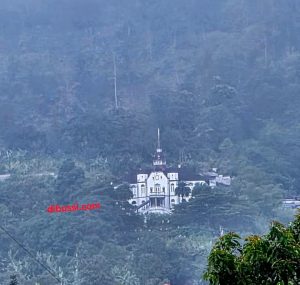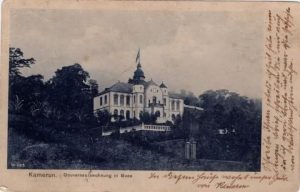

Buea, Cameroon: The schloss [castle], which has been described as “Buea’s Glory,” was constructed by Jesko Von Puttkamer, the Governor of German Kamerun from 1895 to 1907. Completed on June 1, 1902, it was a marvel of its time and considered to be among the finest mansions in West Africa. Nestled on the slopes of Mount Fako and regularly shrouded by Buea’s legendary mist, the Germans called it the Cloud Throne (Wolkenthron) and the Realm of mists (Nebelheim).
Inspired by Bavarian Baroque architecture with its opulent and ornate interior designs, the schloss had an impressive number of turrets, balustrades, and balconies along with an equally impressive minstrels’ gallery adorned with deer heads. Huge fireplaces and stoves imported from Germany kept the building warm.
The flower garden was the pride of the schloss with its profusion of flowers and green lawns. When Lord Lugard, the Governor General of Nigeria, visited the schloss in 1916, he enthused over the avalanche of flowers falling over the stone balustrades from terrace to terrace.
Home to the austere and brutal German governors who ruled over Kamerun, the schloss was viewed by the natives as chilly and uninviting as a Bavarian winter. Surprisingly however, the residence had romantic and tender origins. The story of the Schloss is that of a colonial administrator, deep in the African jungle, longing for his lover in faraway Europe.
According to the legend, an enamored Von Puttkamer commissioned the schloss to entice his beautiful mistress, Pauline, an opera singer in Berlin, to join him in Africa. Unfortunately, after he completed the castle fit for a queen, Pauline refused, imagining a life of idleness, dreariness, and hardship in a disease-ridden African jungle. A heartbroken Puttkamer plastered Pauline’s photographs all over the mansion and engraved two intertwined Ps—presumably representing Paulina and Puttkamer—onto one of the wrought-iron gates of the schloss. It is said that he always insisted on an extra plate being set at the table whenever he dined.
Although the Schloss became one of Germany’s most enduring and popular legacies in Cameroon, Puttkamer’s love-fueled ambition led to his downfall—he was ultimately dismissed as governor of Kamerun after being accused of diverting funds meant for road construction to build his palatial love nest.
Like many stately homes of its kind, the Schloss has its own share of stories and legends about paranormal occurrences, strange sightings and eerie encounters. One of the most enduring tales is that of the ghost of one of Puttkamer’s mistresses, said to wander the corridors and occasionally play the grand piano in the first-floor lobby.
This legend was popularized by Brigadier John Gibbons, the last British Commissioner for the Southern Cameroons, who often recounted an unsettling experience: One afternoon, while home alone with his wife, they both—though in different parts of the house—heard someone playing a Liszt composition on the piano, only to later realize that neither had touched it.
In another version of the story, the wondering ghost always played pieces by Frédéric Chopin, Governor Puttkamer’s favorite composer.
In 1908, the Germans moved their administrative capital back to Douala following the eruption of Mount Fako. However, the Schloss remained the residence of subsequent German governors and, later, 19 British residents and commissioners of Southern Cameroons.
From 1961 to 1972, it served as the Prime Minister’s Lodge, home to the three Prime Ministers of the State of West Cameroon—John Ngu Foncha, Augustine Ngom Jua, and Solomon Tandeng Muna. After the dissolution of the Cameroon federation in 1972 and the transfer of West Cameroon’s government and elite to Yaoundé, the lodge was plundered and abandoned. Its silverware, furniture, and historical artifacts carted off.
Although it was eventually converted into a presidential palace, the Schloss remained largely deserted and was not fully restored until 2014 for the golden jubilee celebrations of the unitary state that replaced the federation. Today, it stands as a heavily guarded fortress, closed to the public.
Based on a yet untitled forthcoming book/memoir.
Tande Dibussi


